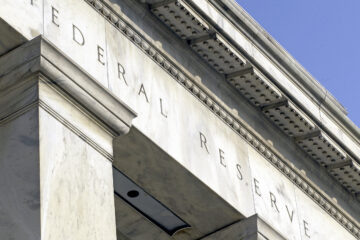US
This week U.S. stocks rose with S&P 500 gaining 1.56% and Nasdaq Composite 2.35%, closing at 3,380.16 and 9,623.58 respectively, these levels marked records for both indices. U.S. market surged relative to its peers as a result of investors beliefs for American market to be the least affected by the outbreak of coronavirus. The VIX recovered from its peak of 19.37 on 31 January, it currently stands at 13.68.
U.S. Federal Reserve Chairman Jerome Powell delivered Congressional testimony, where he indicated that the impact of coronavirus on the economy outlook is still under examination and that the monetary policy is considered as appropriate for the current state of affairs. He also mentioned that he expects the reserves provided by banks to return to sufficient level to prevent the repetition struggles in the repo market. 10-year Treasuries yield stood at 1.59% whereas the two-year US Treasuries yielded 1.42%.
Democratic primary held in New Hampshire resulted with a Bernie Sanders victory. Even if we do not consider him as a market friendly candidate it seems that the market is yet to price in potential Democratic candidates. Pete Buttigieg came in second at New Hampshire after his victory in Iowa. The next caucus is the Nevada Caucuses which will be held in 22nd of February. A poll released this week by Las Vegas Review-Journal showed among potential Nevada caucus goers Bernie Sanders has a 7 percentage point lead in front of Joe Biden.
Universal Music Group announced its IPO, which will happen by early 2023. In 2018 company characterized such a move as too complex, however the recent 22% increase in subscription and streaming sales seem to cause the reversal of the plan.
UK
Post-Brexit negotiations between European Union and UK have toughened, stricter conditions on unfair competition, fishing and human rights are expected. The future of Scotland within the UK remains as a question.
Boris Johnson’s cabinet reshuffle held on Thursday left the government in disarray after Sajid Javid left his post as chancellor of the exchequer. His successor, Rishi Sunak, a former Goldman Sacks banker, is preparing to relax fiscal rules, which was the main issue of disagreement between Mr. Javid and Boris Johnson’s team. FTSE 100 Index was down 0.77% closing at 7.409.13, peaking at over 7,500 during Tuesday-Wednesday and falling back on Thursday. FTSE 250, however, was up 1.35% and reached 21,790.08, indicating that the smaller companies were less affected by the disarray.
The Pound sterling strengthened against dollar rising from 1.29 to 1.30. While the 10-year Gilt yield stood at 0.65% up from 0.596% last week, the 2-year Gilt yield was at 0.547% up from 0.496%.
Europe
The EUR/USD fell to the level last seen in 2017, falling from 1.095 to 1.083. This is an indication of investors’ concern regarding the health of the European economy, caused by the range of factors: lingering coronavirus effect on global economy, downtrend in the euro-area industrial output, vulnerable political situation in the German government, as well as, possible side effects of the stimulus measures undertaken by ECB.
Political convulsions in Germany were caused by the decision of Annegret Kramp-Karrenbauer, the politician favored by Ms Merkel as her successor, to leave CDU party after the public backlash against CDU’s collusion with AfD. Ms Kramp-Karrenbauer’s defeat has sparked the battle for chancellorship with candidates expressing different views for the future path of the bloc. However, European markets continue to gain despite the messy German politics. German DAX rose by 1.70% to 13,744.21. Euro Stoxx 50 was up by 1.12% closing at 3,840.97. STOXX Europe 600 Index recorded a weekly gain of 1.45%, reaching 430.52.
The current week was intense for the European banking CEOs. Credit Suisse published their 4th quarter results and Tidjane Thiam -the outgoing Credit Suisse CEO- delivered the call for the last time-, UBS is reportedly looking for a new CEO whereas Jes Staley of Barclays Plc is under investigation due to links with Jeffery Epstein.
The German 10-year and 2-year Bund yields respectively stood at -0.40% and -0.67%. 10-year Italian BTPs traded with a yield of 0.92% while 2-year BTPs traded with a yield of -0.199%.
RoW
The total loss from coronavirus has topped SARS with 67,000 people infected in China alone and death toll of over 1500 at the end of week. Chinese stocks, the travel sector and energy fund are strongly affected. Asian stocks were mixed on Wednesday, since the coronavirus spread beliefs were outweighed by the expectations of potential policy support. However, on Thursday stocks went down due to the disclosure of a much higher number of coronavirus cases. On Friday China’s Hubei province reported 4,823 additional cases, equity markets’ reaction was mixed due to the difficulties to analyze data. Over the week, HSI and HSCEI went up by 1.50% and 1.48%, reaching 27,815.60 and 10,863.45, correspondingly. The Shanghai Composite Index gained 1.43% closing at 2,917.01.
Oil prices were recovering, however, the surge in reported coronavirus cases brought some uncertainty to the market. In a monthly report OPEC has decreased expectations about the future demand in oil market, mostly due to the undermined fuel demand in China. Russia’s largest oil companies voted for the cut in production in order to support oil prices. WTI went up 3.73% reaching 52.22, while Brent gained 5.03% and closed at 57.24.
Gold went up by 0.3% since 20 January, before coronavirus started affecting the markets, however the volatility remains elevated. At the same time Yen has strengthened by 0.3% against dollar and showed low volatility.



0 Comments